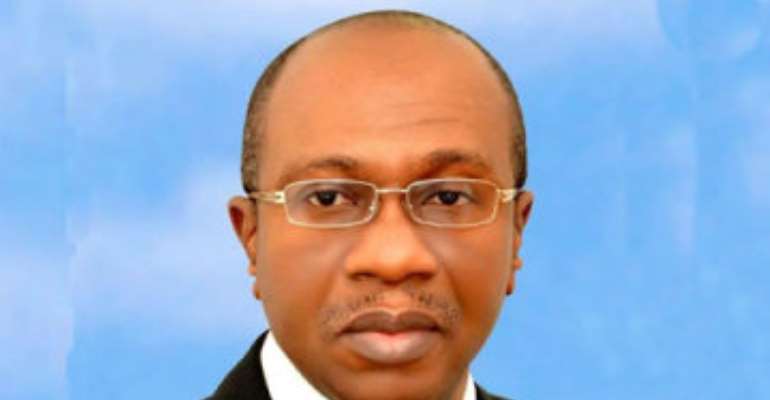Emefiele should avert another bank crisis – Punch

THE unfolding mess in Nigeria's public finances is raising fears of a possible crisis, which the country can ill-afford. Revenues accruing to the government have fallen by half, while public debt is rising, with 24 states unable to meet their monthly wage bills obligation. And with importers of refined petroleum products and power sector operators under severe pressure servicing loans, the banks are once more faced with rising Non-Performing Loans and the possibility of systemic stress. The times call, therefore, for fresh, bold proactive measures by regulators.
Unlike in 2008/9 when it ignored the early warning signs, the Central Bank of Nigeria should not be caught napping this time. The regulator itself raised the alarm recently when it deplored the steady rise of NPLs on the books of the deposit money banks, which, at N42.86 billion, was described as 'rising beyond tolerable limit' by the Director of Banking Supervision, Tokunbo Martins. We welcome the realisation that NPLs, at 3.5 per cent of the estimated total N15 trillion loan portfolio, are troubling enough to attract a response rather than wait until they hit the set five per cent limit. The central bank has, therefore, resolved to bar bad debtors from access to foreign exchange and, according to Martins, 'to publish the names of these borrowers that have refused to pay.' We believe however that the CBN must go beyond the 'name-and-shame' measure and impose harsher penalties.
This month, the CBN maintained its benchmark lending rate at 13 per cent, but reduced the Cash Reserve Ratio for public sector deposits to 31 per cent, down from the 75 per cent high imposed late last year ahead of the 2015 elections to moderate the reckless spending of politicians. The CRR - ratio of cash deposits retained in the vaults - on private deposits was also raised to 31 per cent from 20 per cent.
But, in the short-term, this will not significantly reduce the quantum of bad debts, especially as fears are high that fuel importers, faced with drastic cuts in petrol subsidy payments from the government, may not be able to service their loans. Add to this the huge exposure of the banks to operators of the privatised electricity power generating and distribution firms, who are struggling to survive in a business buffeted by a crippling operating environment and by their own incompetence, then the outlook looks bleak indeed.
We recall that it was bad loans running into trillions of naira that triggered the last banking crisis of 2009/10, apart from other systemic causes. A report by the Nigerian Deposit Insurance Corporation said that credit to the petroleum sector at one time, accounted for 25 per cent of all bank loans in Nigeria. Now that imports and subsidies have slowed, the inability to service those loans may trigger a crisis. Similarly, Afrinvest, a financial services provider, reported that power sector firms had about N250 billion in poorly serviced loans by 2014. And unlike the last round of stress, AMCON, the 'bad bank', decided since last year that it would no longer buy banks' bad debts except at the behest of the CBN.
We ought to have learnt from our past and from the several bank crises in Nigeria. The immediate past CBN Governor, Lamido Sanusi, under whom the system was saved from systemic failure in 2009/10, identified eight factors that led to the post-consolidation crisis, among them, weaknesses in the operating environment, macroeconomic instability, inadequate disclosure of banks' financial position and weaknesses cum failure of supervision by the CBN. The last - regulatory oversight - is, in our view, the most critical in a country where impunity and corruption guide the leadership.
The CBN, therefore, has the critical task of effectively monitoring and policing the financial system to detect problems before they get out of hand and, crucially, to impose very stiff penalties for infractions as serious countries do. In its latest display of low tolerance for financial shenanigans, the United States government has imposed $5.7 billion in punitive fines against five of the world's biggest banks, the latest in a series of actions that have seen several global mega banks paying over $60 billion in penalties, while their officials face possible criminal prosecutions. Here, the banks often get away with a slap on the wrist for infractions. No longer should serial debtors simply walk away, leaving their debts to shareholders or corrupt bankers go scot-free.
A World Bank study found that their respective central banks creatively remodelled the banking structures of Turkey, Brazil, Malaysia and Indonesia after these countries faced banking crises, putting in place, strong regulatory framework and capacity.
That should be the major challenge of the Godwin Emefiele-led CBN. With the naira under stress, falling to N197 against the US dollar from about N156 last year, foreign reserves crashing to $29.75 billion last month and higher NPLs and fraud in the financial system, it should tighten the noose and ensure strict adherence to regulations. Fraud cases in the banks, according to the NDIC, rose by 11.12 per cent in 2013 to 3,756, and by 20.8 per cent in monetary value to N21.79 billion compared to N18.05 billion in 2012.
The elaborate risk management and corporate governance measures put in place in the post-crisis period should be strictly applied. Impunity must be tamed, especially by the incoming administration, to replace the conniving stance of the outgoing government, including a reported move to return part of the N197 billion assets seized from a former bank chief.
Emefiele needs to demonstrate a very strong anti-corruption stance, follow through on the reforms of his immediate predecessor, Sanusi, and strengthen the control mechanisms to avoid systemic crisis.
